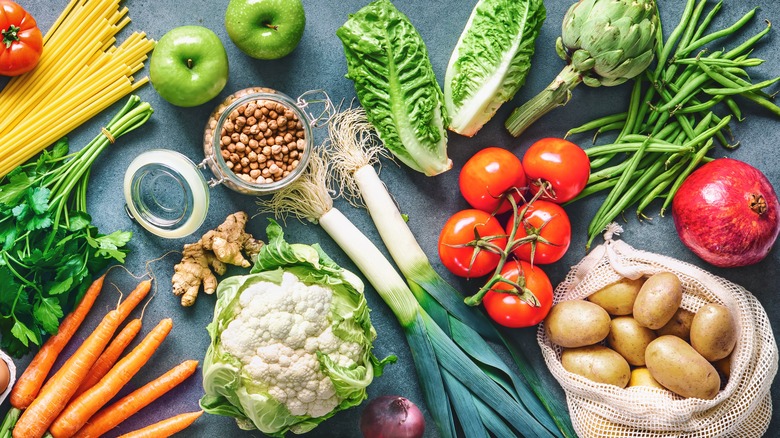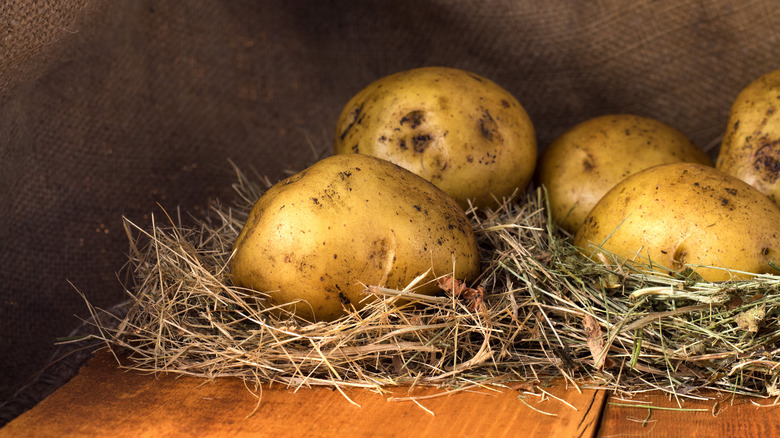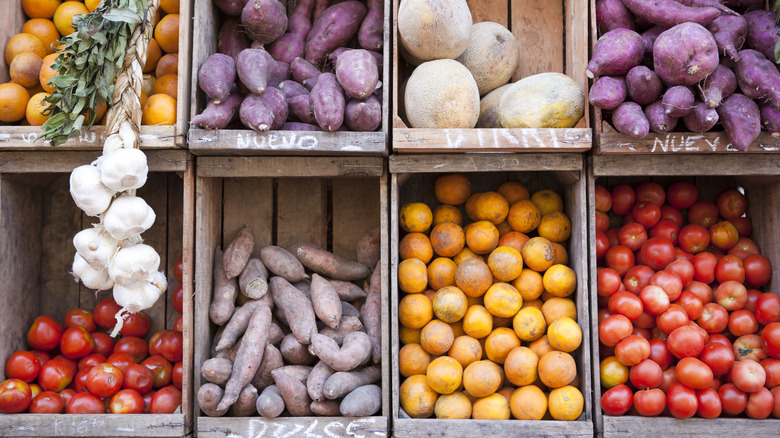The Fruits And Veggies You Should Never Store Near Your Potatoes
Potatoes give us many culinary delights, but if the ones you bought a week or so ago have sprouted eyes and started looking back at you, don't eat them. Spuds with small bumps are safe to eat, once you've cut off the green parts and little lumps. But if the potatoes have grown long roots or large sprouts, they'll do you more good in your compost pile, because, at that point, the potatoes have become high in a compound called solanine. Solanine is found in trace amounts in tomatoes and peppers, and is harmless in small quantities. However, it is toxic in larger amounts, so if your potatoes have developed large, tentacled roots or sprouts — pitch them.
What you may not know is that you have some control over how long your potatoes last before sprouting, and it has to do with how they're stored, and more specifically, what they're stored with. Some fruits and vegetables emit ethylene — a gas that promotes ripening — so if your potatoes are stored close to any ethylene leakers, your potatoes might think it's sprouting season.
Which fruits and vegetables produce ethylene? Bananas, apples, avocados, cantaloupe, peaches, pears, tomatoes, and peppers, among others. Although potatoes aren't as sensitive to ethylene as other fruits and vegetables are, proximity to the gas will definitely encourage sprouting. It also stands to reason that storing fruits and vegetables that release ethylene near produce that is sensitive to the gas is a recipe for spoilage.
The effects of ethylene gas
Ethylene gas is a super-abundant organic compound that does quite a bit more than encourage ripening. In addition to increasing a plant's survivability against environmental stressors such as drought or flooding, ethylene helps determine a plant's sex as well as playing a major role in fruiting, flowering, and root system development. It's a gaseous hormone, which is why the old trick of placing a banana alongside an unripe avocado in a paper bag is so effective — the ethylene gas produced by the banana accumulates and causes the avocado to ripen more quickly. While this is great for making fresh guacamole, it's bad news for potato storage.
As a root vegetable, potatoes don't ripen like fruit; they sprout. If stored in spring-like conditions — which include warmth, light, and an abundance of ethylene gas — potatoes will quite literally come alive. They'll form eyes and ultimately sprouts while losing their firmness and getting soft and rubbery. They'll also turn green; a clear sign that the potatoes are producing chlorophyll and glycoalkaloids. Chlorophyll is what makes plants green, while the two kinds of glycoalkaloids produced by the potato — solanine and chaconine — are concentrated in the eyes and sprouts, and are toxic if consumed in large quantities.
Best storage tips
There are other potato-storage strategies you can employ beyond keeping them separate from the ethylene-production factories. Essentially, potatoes like things dark, cool, dry, and ventilated. So, get them out of plastic bags and consider storing them in your basement, pantry, or fridge (although people are still arguing about whether that last one's a good idea). If any of your spuds are starting to sprout, remove them from the others lest they, too, get similar ideas.
Stored under the right conditions, potatoes might just be the longest-lived of produce. They'll stay fresh for several months if kept in a cool, dry storage spot, although keeping them at room temperature lowers this time frame considerably — down to only a couple of weeks. Potatoes do best when kept between 45 and 55 degrees Fahrenheit — the basic temperature range of a root cellar, where they can live happily with the parsnips and beets. If you don't happen to have a root cellar or basement, you can try to replicate those conditions.


